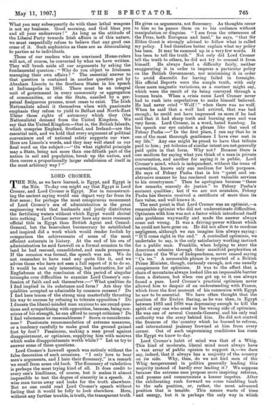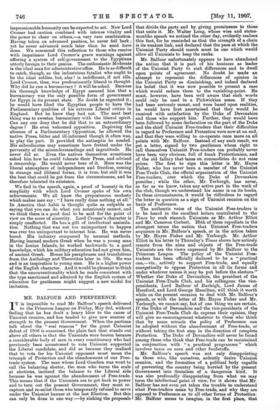LORD CROMER.
THE Nile, as we have learned, is Egypt, and Egypt is the Nile. To-day one might say that Egypt is Lord Cromer, and Lord Cromer is Egypt. Nor in reconstruct- ing the ancient saying would one depart very far from its first sense ; for perhaps the most conspicuous monument of Lord Cromer's era of administration is the great engineering work that husbands and justly distributes the fertilising waters without which Egypt would shrivel into nothing. Lord Cromer never bore any more resonant official title in Egypt than British Agent and Consul- General, but the benevolent bureaucracy he established and inspired did a work which would render foolish by comparison the achievements of some of the most efficient autocrats in history. At the end of his era of administration he said farewell on a formal occasion to the land he had rescued, consolidated, and made prosperous. If the occasion was formal, the speech was not. We do not remember to have read any quite like it, and we advise those who have not seen a full report of it to do so. It would be not only interesting, but instructive, for all Englishmen at the conclusion of this period of singular triumphs over difficulties to examine Lord Cromer's con- fession of faith and ask themselves :—" What qualities do I find implied in its substance and form ? Are they the qdalities accepted as admirable by common consent ? Do I find here traces of the strong man masterfully thrusting his way to success by refusing to tolerate opposition ? Do I discern the liberal-minded man anxious to see round ques- tions and sympathising with opposition, because, being con- scious of his strength, he can afford to accept criticism ? Do I find vehemence or reasonableness ? Scorn or considerate- ness ? Passionate recommendation of extreme measures, or a tendency carefully to make good the ground gained foot by foot ? Pessimism, making a man proof against disappointment, or optimism, supplying him with motives which make disappointments worth while? " Let us try to answer some of these questions.
Lord Cromer's farewell speech was entirely without the false decoration of such occasions. " I only love to bear men's arguments, and I hate their flummery," is a remark we recall from some old book. The flummery of valediction is perhaps the most trying kind of all. It does credit to every one's kindliness, of course, but it makes it almost impossible to test the degree of sincerity in a speech. A wise man turns away and looks for the truth elsewhere. But no one could read Lord Cromer's speech without feeling that it would be folly to look elsewhere. Here, without any further trouble, is truth, the transparent truth. He gives us arguments, not flummery. As thoughts occur to him so he passes them on to his audience without manipulation or disguise. " I see from the utterances of the Press, both European and local," he says, " that Sir Eldon Gorst is strongly advised to follow what is called my policy. I had therefore better explain what my policy has been. It may be summed up in a very few words. It has been to tell the truth." Not only did Lord Cromer tell the truth to others, he did not try to conceal it from himself. He always faced a difficulty fairly, neither exaggerating it in order to impress a particular policy on the British Government, nor' minimising it in order to avoid discredit for having failed in foresight. His official Reports were the simple truth, with only those mere magnetic variations, as a mariner might say, which were the result of its being conveyed through a human brain. When a crisis came Lord Cromer never had to rush into superlatives to make himself believed. He had never cried " Wolf ! " when there was no wolf. When he said that a wolf had arrived, that was bad enough; he could not have impressed us more if he had said that it had sharp teeth and burning eyes and was very fierce. Lord Cromer, in a word, hated humbug. In his speech our eye catches a phrase like that used of Fehmy Pasha :—" In the first place, I can say that he is one of the most thorough gentlemen I have ever met in my life." Any one might be proud to have that tribute paid to him ; yet tributes of similar intent are not generally paid quite in that form. Why not? Because there is one medium for saying what you think of a man in private conversation, and another for saying it in public. Lord Cromer's mind, which is independent, without the irons of convention, knows only one medium for both purposes. He says of Fehmy Pasha that in his " quiet and un- obtrusive manner lie has rendered most valuable services to his countrymen." Then he apologises because "these few remarks scarcely do justice" to Palmy Pasha's eminent qualities ; but if we are not mistaken, Fehmy Pasha has therein received a certificate of more than its face value, and well knows it.
The next point is that Lord Cromer was an optimist,—a, reasonable optimist who did not underestimate difficulties. Optimism with him was not a factor which introduced itself into problems waywardly and made the answer always come out wrong. It was a driving-power without which he could not have gone on. He did not allow it to condone negligence, although we can imagine him always saying : " It'll come right in the end." A controlled optimism, we undertake to say, is the only satisfactory working instinct for a public man. Franklin, when helping to steer the American colonies through their manifold perplexities at the time of the War of Independence, never ceased saying
ca ira." A memorable phrase is reported of a British Prime Minister, though, curiously enough, not one usually conspicuous for optimism. It was to the effect that a chain of mountains always looked like an impassable barrier from a distance, but when one got up to it one always found a pass. Lord Cromer's practical optimism never allowed him to despair of an understanding with France, which from the first moment of his connexion with Egypt he saw to be essential. We have often thought that the position of Sir Evelyn Baring, as he was then, in Egypt between 1883 and 1898 was depressing enough to kill the spirit of any one who erred on the wrong side of optimism. He was one of several Consuls-General, and his only real authority was the army behind him. He did not control the finances of the 'country which he burned to reform, and international jealousy frowned at him from every corner. Out of such unpromising conditions has risen the Egypt we know to-day.
Lord Cromer's habit of mind was that of a Whig. This kind of moderate, liberal mind must always have a vast array of public opinion to support it,—we dare say, indeed, that it always has a majority of the country on its side. Why, then, do we not find men of the Whig 'temperament in politics generally leading this majority instead of hardly ever leading it ? We suppose because the extreme men propose more inspiring reforms, and possess and communicate a keener impetus. After the exhilarating rush forward we come tumbling back to the safe position, or, rather, the most advanced position that is tenable. This means waste of time and energy, but it is perhaps the only way iu which
impressionable humanity can be expected to act. Now Lord Cromer had caution combined with intense vitality and the power to cheer on others,—a very rare combination. Having taken an advanced position, he never fell back ; yet he never advanced much later than he need have done. We commend this reflection to those who receive with impatience Lord Cromer's grave warnings against offering a system of self-government to the Egyptians utterly foreign to their genius. The enthusiastic Moderate is the ideal man for administrative office. He is as difficult to catch, though, as the industrious fatalist who ought to be the ideal soldier, but, alas ! is indifferent, if not idle. Lord Cromer, then, was predominantly liberal in thought. Why did he run a bureaucracy ? it will be asked. Because his thorough knowledge of Egypt assured him that a bureaucracy was the only possible form of government for Egypt in its present state. No doubt he regretted it; he would have liked the Egyptian people to have the Parliamentary qualities of his extreme Liberal critics in England. But he knew they had not. The next best thing was to sweeten bureaucracy with the liberal spirit. Can any one deny that he did that to an extraordinary degree ? He even welcomed opposition. Deploring the absence of a Parliamentary Opposition, he allowed the native Press, bitter and ill-informed though it often was, to play the part. It provided the antiseptic he needed. His subordinates may sometimes have fretted under the perversity of the misunderstandings and ingratitude. He never did so. Even the natives themselves sometimes asked him how he could tolerate their Press, and advised a censorship. He would never hear of it. Here was the liberal atmosphere of independence and freedom, coming in strange and illiberal forms, it is true, but still it was the best that could be got from the circumstances, and he therefore tolerated its existence.
We find in the speech, again, a proof of honesty in the simplicity with which Lord Cromer spoke of his own achievements. We all know the preposterous modesty which makes men say : " I have really done nothing at all." In America that habit is thought quite as culpable as Saying that you can do what you notoriously cannot, and we think there is a good deal to be said for the point of view on the score of sincerity. Lord Cromer's character is simply unaffected. He has a gift of intellectual assimila- tion. Nothing that was not too unimportant to happen was ever too unimportant to interest him. He was never bored. His industry conquered by unusual methods. Having learned modern Greek when he was a young man in the Ionian Islands, he worked backwards to a good knowledge, which his military education had not given him, of ancient Greek. Hence his paraphrases and translations from the Anthology and Theocritus later in life. He was and is an inspiration to young men. He is a higher power of the English character. And it would be pleasant to think that the unconventionality which he made consistent with the type sanctioned and admired by the English system of education for gentlemen might suggest a new model for imitation.











































 Previous page
Previous page